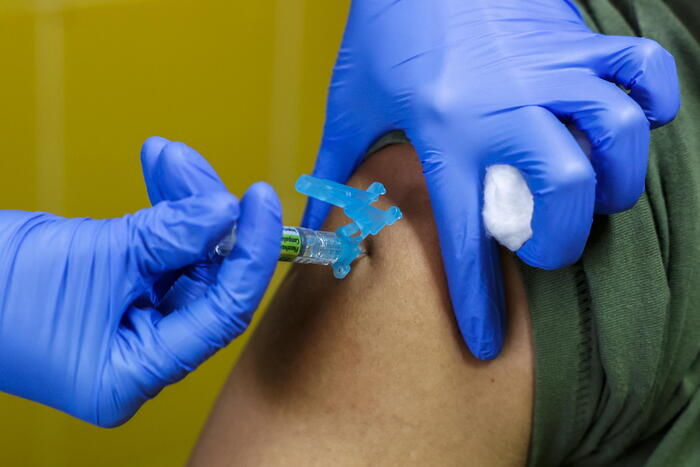Hello,
The bar of 160,000 deaths from Covid-19 was crossed on Tuesday, reminding us that the virus still kills.
There are 89 deaths per day on average in hospital.
So, before the end of year celebrations, there is still time to get vaccinated and thus protect yourself, if not from transmission, at least from serious forms of the disease.
The Ministry of Health recalled that, even if the booster dose primarily concerns fragile people, all French people who wish can benefit from it.
The hospital, wrung out by winter epidemics, will thank them.
Finally, let's end the year with good news: despite the outbreak of the epidemic in China, the WHO hopes for 2023 the end of the global health emergency.
Good reading,
Camille Lestienne, journalist at
Le Figaro
1. More than 160,000 dead
Sars-CoV-2 has killed more than 160,000 people in France since the start of the epidemic.
ktsdesign / stock.adobe.com
The virus still kills.
On Tuesday, the threshold of 160,000 deaths linked to Covid-19 in France was crossed, including nearly 40,000 in 2022 alone. In total, since the start of the epidemic, 160,122 people have died with a Covid diagnosis according to figures from French Public Health.
Another figure unveiled on Tuesday, 70,000 people died from the coronavirus in 2020, making it the third leading cause of death behind cancer and cardiovascular disease.
Just over half of the victims of a Sras-Cov-2 infection in 2020 were 85 years old or older, reveals the study by Public Health France, Drees and Inserm.
If the confinements had a protective effect in the face of mortality risks such as transport accidents or respiratory diseases, “
other impacts on mortality from this outbreak and its longer-term context cannot be ruled out, which requires continued regular surveillance across all causes of death
,” the authors conclude.
Numbers
62,340
new confirmed cases per 24 hours on average over 7 days
23,742
people hospitalized (+12.5% in 7 days)
1,341
people in critical care (+17.1 in 7 days)
89
deaths per day on average in hospital (+23.6% in 7 days)
Source Public Health France as of December 14
2. Vaccinated for Christmas
The booster dose of vaccination against Covid is open to all French people who wish it.
ERIC GAILLARD / REUTERS
The information around the booster dose had been unclear, causing some pharmacists to refuse vaccination requests.
The rules are now clear and recalled in a document sent by the Directorate General for Health (DGS) to health professionals.
If the booster is “
very strongly recommended
” to fragile people, “
all French people who wish [can] be vaccinated as a booster against Covid
“, insists the Ministry of Health.
The booster can be carried out as early as six months after the last injection and three months after the last Covid infection.
But is it too late to get vaccinated and be protected for the holidays?
There really is no need to delay.
The vaccine is fully effective a fortnight after the injection, but shows the first signs of effectiveness after a week.
If it does not block virus transmission, the vaccine is effective against severe forms of the disease.
In any case, we can feel the start of an acceleration of the vaccination campaign: the number of people vaccinated with a booster adapted to the Omicron variant rose from 52,138 on average smoothed over seven days on December 4 to 85,373 on December 11.
Indeed, according to a survey, the French say they are worried about the health situation.
” READ ALSO –
Should the vaccination of caregivers against the flu be made compulsory, as for Covid-19?
3. The quote
It is not the wave of Covid that is most feared now.
But it is the situation of the hospital as a whole that is catastrophic.
Xavier Monnet, head of the intensive care-resuscitation department at Bicêtre hospital (AP-HP)
The triple epidemic of Covid, flu and bronchiolitis continues to plague the hospital.
And the contaminations expected during festive and intergenerational gatherings will not help matters.
“
The Covid no longer directly threatens critical care services, but we will have to take care of patients in the days to come, whether they are immunocompromised people or the elderly.
We really wonder how we are going to be able to accommodate them
, ”warns Xavier Monnet, head of the intensive care-resuscitation department at Bicêtre hospital (AP-HP)
.
To avoid hospitalization of the most vulnerable, the antiviral treatment Paxlovid is now more widely available thanks to "
the conditional prescription
announced last Friday by the Minister of Health.
It allows physicians to prescribe Paxlovid upstream in the context of a traditional medical appointment.
The patient can then present it to the pharmacist after catching the virus and within five days of their first symptoms.
” READ ALSO –
Covid-19, flu, bronchiolitis … In the emergency room of Arcachon, “
we are overwhelmed
”
4. Soon the end of the global health emergency?
The Chinese are no longer undergoing massive tests but fear contagion as the epidemic flares up.
ALY SONG / REUTERS
There are no longer compulsory tests in China, so how to measure the exact scale of the epidemic outbreak which seems to affect the country and particularly Beijing?
A sign however: the streets of the capital are little frequented despite the reopening of shopping centers and restaurants.
Many sick Chinese take care of themselves at home or fear contagion.
Can this strong circulation of the virus in a population with low immunity favor the emergence of a new variant?
And should this worry us in France and in Europe?
Not really, according to experts interviewed by
Le Figaro
.
For this to particularly affect us, the variant would have to escape the immunity acquired elsewhere against the sub-variants of Omicron.
"
I really had a hard time believing that such a variant would appear in the short term there
,
”
reassures virologist Bruno Lina.
Even the World Health Organization (WHO) said on Wednesday it hopes that Covid-19 “
would no longer be a global health emergency
” in 2023. The Covid-19 emergency committee will meet in early January to discuss criteria. making it possible to establish or not the end of the health emergency.
In reality, Covid-19 “
is not going to disappear
” but “
all countries will have to learn to manage it at the same time as other respiratory diseases
”, recalls the WHO.
5. The reflexes to keep
The virus is transmitted by droplets and aerosols.
The barrier gestures detailed by the Ministry of Health must be observed to protect themselves and others:
Wear the mask in closed and crowded places, especially for fragile people, with symptoms or contact cases.
Ventilate the rooms as often as possible, at least a few minutes every hour.
Wash your hands regularly or use hydroalcoholic gel.
Greet without shaking hands and stop hugging.
Cough or sneeze into the crease of your elbow.
Use single-use tissues.
6. What to do in case of symptoms?
The disease is most often manifested by cough, fever or feeling feverish, loss of smell and taste, fatigue.
If after a few days you have trouble breathing or are short of breath, you should contact 15. Symptoms are often milder with the Omicron variant, similar to those of a cold: sore throat, headache, runny nose.
In case of signs of the disease, the most important thing is to get tested.
The test, PCR or antigen, remains free for those who have not been vaccinated on medical prescription or after having been identified as a contact case by Health Insurance.
In the event of a positive result on a self-test, a confirmation PCR test is recommended.
While waiting for the result, you must isolate yourself and wear a mask.
In the event that the test is positive,
isolation must last 7 days
from the first symptoms for vaccinated persons,
10 days
for unvaccinated people.
It can be broken on D+5 or D+7 respectively, if you have a negative test and you have had no symptoms for 48 hours.
Good to know, since March 21, 2022, contact cases no longer need to isolate themselves, vaccinated or not, but wearing a mask is recommended and teleworking is preferred as far as possible.
” READ ALSO –
You have just learned that you are positive for Covid-19, what to do?
See you soon.



/cloudfront-eu-central-1.images.arcpublishing.com/prisa/PCE7NMB26ZDVRIQX2R26JSNH6A.jpg)




